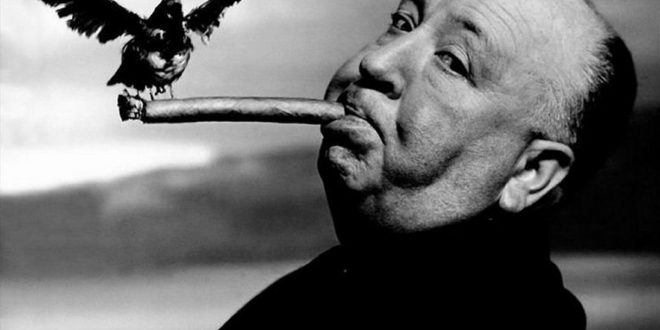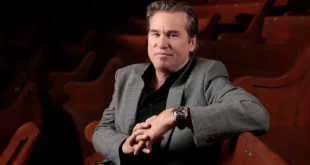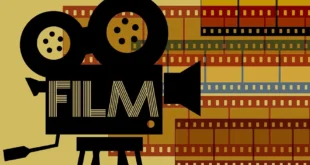This past month would have been Alfred Hitchcock’s 120th birthday. Hitchcock was the groundbreaking creator of a new kind of mystery, earning him the title The Master of Suspense. He paved the way for modern day thrillers and horror films. We’ve discussed both the master himself and his films. Rear Window also turned 65 this year. Read our retro review HERE. I’ve even discussed how Psycho is one of my favorite horror films. I thought it would be interesting to share some fascinating facts and quotable quotes from the man that you may or may not know.
Alfred Hitchcock Trivia
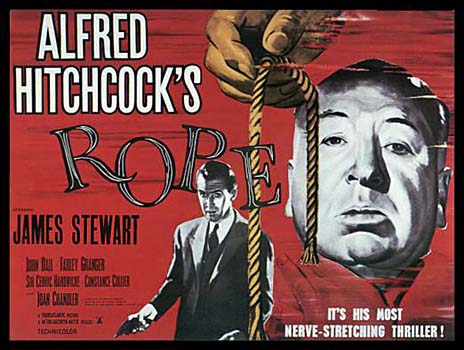
Many of Hitchcock’s films have one word titles: Blackmail (1929), Rebecca (1940), Suspicion (1941), Saboteur (1942), Lifeboat (1944), Spellbound (1945), Notorious (1946), Rope (1948), Vertigo (1958), Psycho (1960), Marnie (1964), Topaz (1969) and Frenzy (1972). He favored one word titles because he felt that they were uncluttered, clean and easily remembered by the audience.
For Psycho, Hitchcock deferred his standard $250,000 salary in lieu of 60% of the film’s net profits. His personal earnings from the project exceeded $15 million. Adjusted for inflation, that amount would top $150 million in 2006 terms.
He received more Academy Award nominations for Best Director without a win than anyone other than Clarence Brown. He was nominated for Rebecca, Lifeboat, Spellbound, Rear Window and Psycho.
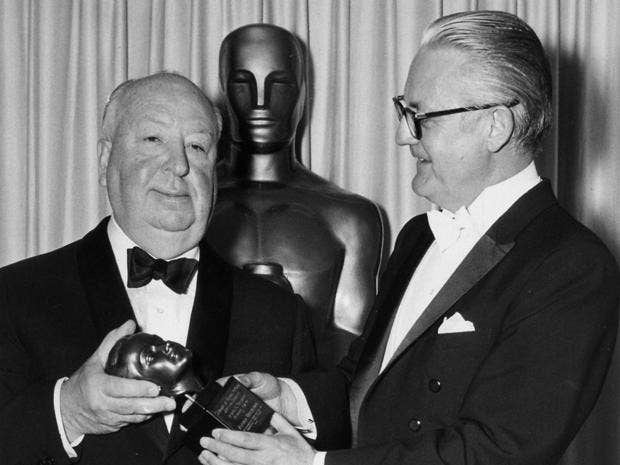
In a fall 2000 USC class on Hitchcock, guest speaker and daughter of the director, Patricia Hitchcock, revealed that two guilty pleasures of Hitch’s were Smokey and the Bandit (1977) and Benji (1974).
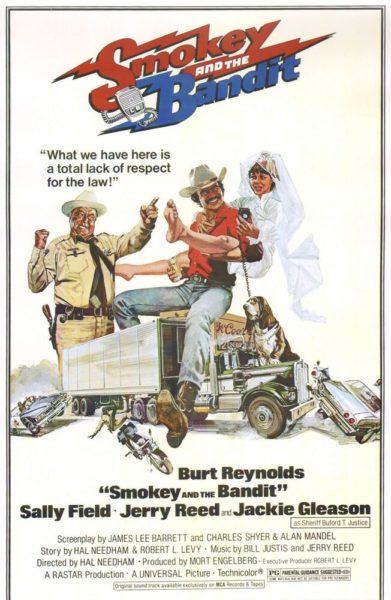
If you watch his films closely noting the endings or portrayal of cops, you will see that if a cop is required to die, the death will be slow, gruesome or uncompromisingly grisly. If cops survive, they are nearly always portrayed as baddies, though in reality, they are the good guys. This is because Hitchcock had a life-long phobia of policemen. In addition to his fear of the police, Hitchcock possessed one other phobia: eggs.

He appears momentarily in a trademark/cameo role in all of his movies. In addition the neon silhouette in Rope, he is seen walking down the street during the opening credits. During the movie, the characters of Mrs. Atwater and Janet are discussing a movie whose one word title they can not remember. It was a plug for one of Hitchcock’s other movies, Notorious.
In the late 1940s, Hitchcock had plans to make a modernized version of Hamlet. Hitchcock’s Shakespearean vision was of a “psychological melodrama” set in contemporary England, and starring Cary Grant in the title role. The project was scrapped when Hitchcock’s studio caught wind of a potential lawsuit from a professor who had already written a modern-day version of Hamlet.
Following Psycho, Hitchcock re-united with Ernest Lehman for an original screenplay idea: A blind pianist, Jimmy Shearing (a role for James Stewart), regains his sight after receiving the eyes of a dead man. Watching a Wild West show at Disneyland with his family, Shearing would have visions of being shot and would come to realize that the dead man was in fact murdered and the image of the murderer is still imprinted on the retina of his eyes. The story would end with a chase around the ocean liner RMS Queen Mary. Walt Disney reputedly barred Hitchcock from shooting at Disneyland after seeing Psycho. Stewart left the project, Lehman argued with Hitchcock, and the script was never shot.
Note – I am disappointed this film never came to be. It sounds amazing!
Alfred Hitchcock Quotes
[on his lifelong fear of eggs (“ovophobia”)]“I’m frightened of eggs, worse than frightened, they revolt me. That white round thing without any holes… have you ever seen anything more revolting than an egg yolk breaking and spilling its yellow liquid? Blood is jolly, red. But egg yolk is yellow, revolting. I’ve never tasted it.”
[on how to properly build suspense]
“Four people are sitting around a table talking about baseball or whatever you like. Five minutes of it. Very dull. Suddenly, a bomb goes off. Blows the people to smithereens. What does the audience have? Ten seconds of shock. Now take the same scene and tell the audience there is a bomb under that table and will go off in five minutes. The whole emotion of the audience is totally different because you’ve given them that information. In five minutes time that bomb will go off. Now the conversation about baseball becomes very vital. Because they’re saying to you, ‘Don’t be ridiculous. Stop talking about baseball. There’s a bomb under there.’ You’ve got the audience working.”
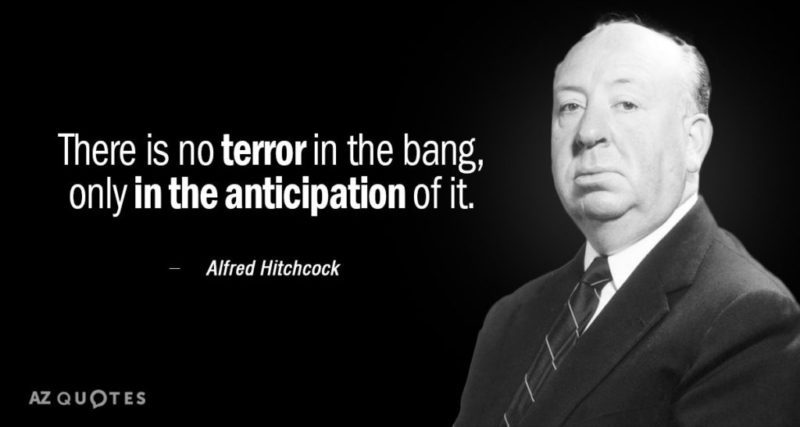
“Fear isn’t so difficult to understand. After all, weren’t we all frightened as children? Nothing has changed since Little Red Riding Hood faced the big bad wolf. What frightens us today is exactly the same sort of thing that frightened us yesterday. It’s just a different wolf. This fright complex is rooted in every individual.”
[on the making of Psycho and a fake torso made by the special effects department that spurted blood when stabbed with a knife]
“But I never used it. It was all unnecessary because the cocking of the knife, the girl’s face and the feet and everything was so rapid that there were 78 separate pieces of film in 45 seconds.”
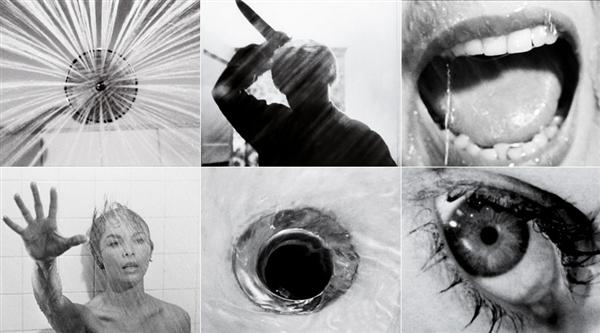
“I am scared easily. Here is a list of my adrenaline-production: 1: small children, 2: policemen, 3: high places, 4: that my next movie will not be as good as the last one.”
Alfred Hitchcock is one of my favorite filmmakers. I love many of his movies and TV series, and I rewatch them quite often. They definitely hold up in modern days. I believe that he knew how to touch on basic fears and turn them into nightmares. Whether it is something so simple as a shower (Psycho) or small animals (The Birds), you never looked at either the same way again.
I’ve included a short BBC interview from 1960 below with the master himself.
 PopHorror Let's Get Scared
PopHorror Let's Get Scared
